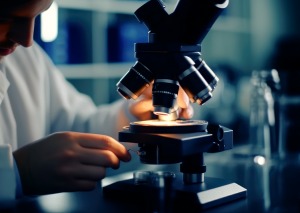RPA Therapy: Potentially Providing New Hope for Chronic Pain Patients
DESCRIPTION: Regenerative Protein Array (RPA) represents a groundbreaking advancement in the science of tissue healing. RPA is a sophisticated array of proteins, growth factors, and cytokines derived from placental tissue. This innovative approach is based on the understanding that the therapeutic power of regenerative medicine lies not in the direct transformation of injected stem cells into target tissues, but rather in their ability to modify the surrounding cellular environment through key biological messages.
Is your practice ready to harness the full potential of regenerative medicine? Genesis Regenerative is pioneering the use of Regenerative Protein Array (RPA) therapy to transform pain management in rheumatology. This cutting-edge therapy combines an array of proteins, growth factors, and cytokines derived from pristine and FDA/CLIA lab tested placental tissue, designed to enhance and promote healing and regeneration at a cellular level.
Regenerative protein array therapy stands out because it offers a more potent alternative to conventional treatments like Platelet Rich Plasma (PRP). The superior therapeutic effects of RPA are due to it’s comprehensive range of regenerative cell factors, which significantly enhance its capability to modify the cellular environment. This innovation is not just about transforming injected stem cells but about empowering them to communicate key biological messages to the surrounding tissues.
Restoring the equality of life for chronic pain patients has long been challenging due to the complexity of underlying conditions causing such pain, which affects millions of people globally. Regenerative medicine and associated research are demonstrating that there may open new avenues for addressing these issues by tapping into the body’s natural repair mechanisms. RPA contains one of the broadest arrays of proteins, growth factors, and cytokines that this research has shown may provide an alternative to invasive procedures or prolonged medication use. Research has shown these factors to:
· Utilizes bioactive proteins to stimulate cellular signaling and tissue regeneration.
· Promote angiogenesis and reduces inflammation, crucial for effective repair of damaged tissues.
· Support differentiation of stem cells into various cell types needed for specific tissue repair.
These proteins, growth factors, and cytokines like those found in RPA may have a significant impact in giving patients a real opportunity for pain relief and better functionality. Such regenerative therapies could potentially be game changers for treating conditions that were once considered irreversible, leading to more sustainable and effective results.
Are you interested in exploring how therapies like RPA may enhance your approach to treating chronic pain patients? Contact Genesis Regenerative today to learn more about their innovative RPA solutions and see how this therapy can integrate into your practice. Unlock the future of pain management and help your patients experience the benefits of regenerative medicine. ㅤ ㅤ ㅤ ㅤ ㅤ ㅤ ㅤ ㅤ ㅤ ㅤ ㅤ ㅤ ㅤ ㅤ ㅤ ㅤ ㅤ ㅤ ㅤ ㅤ ㅤ ㅤ ㅤ ㅤ ㅤ ㅤ ㅤ ㅤ ㅤ ㅤ ㅤ ㅤ ㅤ ㅤ ㅤ ㅤ ㅤ ㅤ ㅤ ㅤ ㅤ ㅤ ㅤ ㅤ ㅤ ㅤ ㅤ ㅤ ㅤ ㅤ ㅤ ㅤ ㅤ ㅤ ㅤ ㅤ ㅤ ㅤ ㅤ ㅤ ㅤ ㅤ ㅤ ㅤ ㅤ ㅤ ㅤ ㅤ ㅤ ㅤ ㅤ ㅤ ㅤ ㅤ ㅤ ㅤ ㅤ ㅤ ㅤ ㅤ ㅤ ㅤ ㅤ ㅤ ㅤ ㅤ ㅤ ㅤ ㅤ ㅤ ㅤ ㅤ ㅤ ㅤ ㅤ ㅤ ㅤ ㅤ ㅤ ㅤ ㅤ ㅤ ㅤ ㅤ ㅤ ㅤ ㅤ ㅤ ㅤ ㅤ ㅤ ㅤ ㅤ ㅤ ㅤ ㅤ ㅤ ㅤ ㅤ ㅤ ㅤ ㅤ ㅤ ㅤ ㅤ ㅤ ㅤ ㅤ ㅤ ㅤ ㅤ ㅤ ㅤ ㅤ ㅤ ㅤ ㅤ ㅤ ㅤ ㅤ ㅤ ㅤ ㅤ ㅤ ㅤ ㅤ ㅤ ㅤ ㅤ ㅤ ㅤ ㅤ ㅤ ㅤ ㅤ ㅤ ㅤ ㅤ ㅤ ㅤ ㅤ

